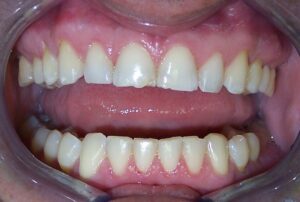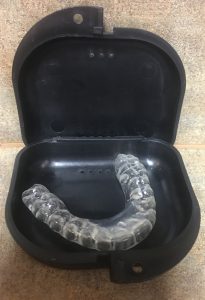Is 2020 Making You Clench Your Teeth?
 There is no doubt that this has been an extremely stressful year. We are continuing to fight the COVID-19 pandemic, we have seen natural disasters on an alarming scale, our political climate is more polarized than ever before, and there is unrest in many cities.
There is no doubt that this has been an extremely stressful year. We are continuing to fight the COVID-19 pandemic, we have seen natural disasters on an alarming scale, our political climate is more polarized than ever before, and there is unrest in many cities.
One of the physical manifestations of this increased stress level is the dental phenomenon of bruxism. Bruxism is the term that encompasses both clenching and grinding of the teeth, placing heavy forces on the teeth, muscles of the face and jaw joints.
What are the Symptoms of Bruxism?
You may not realize that you are clenching or grinding your teeth. If you experience any of these symptoms, you should ask Dr. Ann if she sees any signs of bruxism (covered in the next section). Some of these symptoms are relatively obvious, and others are more subtle. If you suffer from multiple symptoms listed here, the probability that you are grinding or clenching your teeth is high.
A symptom is something that you, as the patient, can feel and identify to your dentist and not something that is easily seen from an outside perspective.
- Pain or Muscle Tension in the Cheeks – As your muscles flex constantly during your clenching or grinding, they become sore or tender. Just like a hard workout can make your arms and legs sore, heavy clenching can make your facial muscles sore.
- Consistent Headaches – One of the muscles involved in teeth clenching and grinding is located in the temple region and fans out to cover a large portion of the sides of the head. Headaches in the temple and forehead region are often caused by clenching or grinding.
- Pain in or near the Ears – Heavy clenching causes compression in the jaw joints, which are just in front of the ears. Many people experience pain and inflammation in the TMJs from heavy clenching, which can refer pain into the ears.
- Ringing in the Ears – That same joint pressure can cause ringing in the ears, known as tinnitus.
- Generalized Sensitivity of Most or All of the Teeth – The excess forces applied to the teeth during clenching or grinding can make the nerves within hypersensitive. When someone experiences sensitivity on a majority of his teeth, it is less likely to be an individual tooth problem and more likely to be improper bite forces.
What are the Signs of Bruxism?
 Signs are different from symptoms in that they show visible evidence of the condition. Your dentist cannot see a symptom, but she can see a sign. When someone clenches or grinds her teeth consistently, the habit leaves evidence inside the mouth that your dentist will identify.
Signs are different from symptoms in that they show visible evidence of the condition. Your dentist cannot see a symptom, but she can see a sign. When someone clenches or grinds her teeth consistently, the habit leaves evidence inside the mouth that your dentist will identify.
- Enlarged Cheek Muscles – As with other muscles, when you exercise them a lot, they get bigger. People who clench or grind their teeth consistently tend to have enlarged muscles in the cheeks and/or temples.
- Callous Lines on the Inner Cheeks – The friction of clenching and/or grinding leads to a buildup of callous tissue in a line on the inside of the cheeks. The line itself is not a concern. It is simply a sign that you are clenching or grinding your teeth.
- Scalloped Shape of the Tongue – Just like the line on the cheeks, the pressure and friction on the tongue from clenching and grinding causes a change. With the tongue, it takes on a scalloped edging on the sides that face the teeth. Some may refer to this as “pie crust tongue”. This, and the previous sign, will go away when you stop clenching or grinding.
- Flattening of the Biting Edges or Chewing Surfaces of the Teeth – Heavy clenching and grinding gradually wears away the enamel on the biting edges (front teeth) and chewing surfaces (back teeth). You cannot regrow enamel, so this flattening is an irreversible consequence of bruxism.
- Notching in the Teeth at the Gumlines – Officially called abfractions, these notches develop in response to heavy forces that cause flexing and bending in individual teeth. This is another irreversible loss of tooth structure.
- Cracked Teeth – Some people clench and/or grind their teeth with so much force that the teeth actually crack or split. Cracked teeth cause sensitivity to cold and pain on chewing. They are difficult to diagnose and even more difficult to successfully treat. Teeth that already have large fillings have a high risk for cracking.
What are the Risks of Bruxism?
Aside from the annoyance of the symptoms you may note, bruxism can lead to some serious dental problems that require expensive treatment. With severe bruxism, some people experience multiple cracked teeth, which often require dental crowns and root canals to repair. Some have such severe flattening of the teeth that the dentist must rebuild every tooth with crowns in order to correct the bite and restore the original appearance.
We have seen notches at the gumline develop so deeply into the tooth that the entire visible portion of tooth just breaks off from the root. Just like chopping down a tree, when the notch penetrates far enough into the tooth, it only takes a small amount of force to completely break it.
Other people cause severe damage to the jaw joints, requiring invasive TMJ surgery to relieve chronic pain and resume normal chewing function.
What Can I Do About Bruxism?
 When you and your dentist catch these signs and symptoms early, you can protect your teeth, muscles and jaws from these dangerous effects of bruxism. Most of the time, the prevention is as simple as wearing a custom nightguard while you sleep. A nightguard that will adequately protect your teeth, muscles and jaws should be hard acrylic and custom fitted for your teeth. Many people prefer to purchase an over-the-counter moldable mouthguard to try first. This is fine if you need to confirm that you can tolerate sleeping with something on your teeth. However, you must understand some important differences.
When you and your dentist catch these signs and symptoms early, you can protect your teeth, muscles and jaws from these dangerous effects of bruxism. Most of the time, the prevention is as simple as wearing a custom nightguard while you sleep. A nightguard that will adequately protect your teeth, muscles and jaws should be hard acrylic and custom fitted for your teeth. Many people prefer to purchase an over-the-counter moldable mouthguard to try first. This is fine if you need to confirm that you can tolerate sleeping with something on your teeth. However, you must understand some important differences.
First, a non-custom nightguard is, by necessity, one size fits all. This means it is likely to be bulky and uncomfortable. A custom-made guard from your dentist has much smaller dimensions, as we make it from an exact replica of your teeth. It is never larger than the few millimeters of thickness required for strength and durability.
Next, most over-the-counter mouthguards are slightly soft in consistency. This is necessary in order for you to be able to mold them to fit over your teeth. This squishiness often causes increased muscle force. Imagine holding a soft, squishy stress ball in your hand and not squeezing it. It’s almost impossible, right? That’s the same reflex your jaws will have with a soft, moldable mouthguard on your teeth.
The very best thing you can do about bruxism is talk to Dr. Ann. She will assess your current status and recommend the best options for preventing any further dental damage from heavy clenching and/or grinding.
More Questions about Teeth Clenching?
Call Designer Smiles today and schedule a consultation with Dr. Ann. She can answer any questions you have about clenching, evaluate your mouth for signs of it, and recommend ways to prevent consequences of this unconscious, but dangerous, habit.
